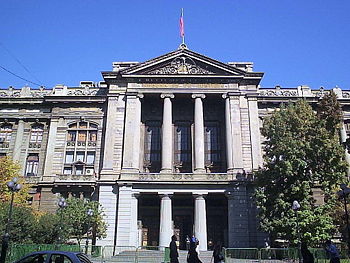- Supreme Court of Chile
-
The Supreme Court of Chile is the highest court in Chile. It also administrates the lower courts in the nation. It is located in the capital Santiago.
In the Chilean system, the court lacks the broader power of judicial review — it cannot set binding precedent or invalidate laws. Instead, it acts on a case-by-case basis. Trials are carried out in salas, chambers of at least five judges, presided over by the most senior member.
Contents
Membership
The members of the Supreme Court are appointed by the President, but must be chosen from a list of five choices which is prepared by the sitting members of the court. Two of these choices must be senior judges from appellate courts; the other three need not have any judicial experience. The president's choice must then be ratified by the Senate.
Supreme Court justices must be at least 36 years old. Once appointed, a Chilean Supreme Court justice is extremely difficult to remove from office. Justices are entitled to remain on the Court until the compulsory retirement age of 75. Otherwise, a justice can be removed only if he or she incurs in "notorious abandonment of duty" established in the Constitution.
The Supreme Court has twenty-one members, called ministros. One member is selected to serve a two-year term as President of the Supreme Court.
Main article: List of presidents of Supreme Court (Chile)Current Supreme Court members
The composition of the Supreme Court changes relatively quickly, as judges attain the retirement age of 75. This list was last updated on May 25, 2009.[1]
- Milton Iván Juica Arancibia (President)
- Urbano Marín Vallejo
- Orlando Antonio Álvarez Hernández
- Nibaldo Segura Peña
- Adalis Salvador Oyarzún Miranda
- Jaime del Carmen Rodríguez Espoz
- Rubén Alberto Ballesteros Cárcamo
- Sergio Manuel Muñoz Gajardo
- Margarita Eliana Herreros Martínez
- Hugo Enrique Dolmestch Urra
- Juan Araya Elizalde
- Raúl Patricio Valdés Aldunate
- Héctor Guillermo Carreño Seaman
- Pedro Pierry Arrau
- Gabriela Pérez Paredes
- Sonia Mireya Araneda Briones
- Carlos Guillermo Künsemüller Loebenfelder
- Haroldo Osvaldo Brito Cruz
- Guillermo Enrique Silva Gundelach
- Rosa María Maggi Ducommun
- Vacant
Notable decisions
Augusto Pinochet
See also: Chile under Pinochet and Human rights in ChileThe Chilean Supreme Court has been involved in many important human rights cases regarding the former Chilean dictator Augusto Pinochet.
- In July 2002, it dismissed a case against Pinochet, saying that he was unfit to stand trial due to dementia.
- In August 2004, it confirmed a lower court's decision that Pinochet should lose his automatic immunity he acquired from being a former senator.
- In March 2005, it reversed a lower court's decision stripping Pinochet of immunity in the case of the assassination of Carlos Prats.
- In August 2007, it upheld a life sentence for Hugo Salas Wenzel, the first senior official to receive a life term for human rights violations conducted during the reign of Pinochet. [1]
Gay rights
Main article: LGBT rights in ChileThe Chilean Supreme Court has made controversial decisions in the area of gay rights.
- In 2004, it confirmed a lower court's decision that stripped former judge Karen Atala of custody of her three daughters because she is a lesbian. The case has been taken up by the Inter-American Commission on Human Rights.
- In January 2004, it removed judge Daniel Calvo from his position on the Santiago Court of Appeals, after media reports that he visited a sauna frequented by gay men. (See Spiniak Case.)
Women's Health
- In November 2005, the Chilean Supreme Court ruled that the sale of contraceptive morning-after pill Postinor 2 is constitutional.
Alberto Fujimori
On September 21, 2007, the court accepted Peru's request to extradite former president Alberto Fujimori, on human rights and corruption charges.
References
External links
- (Spanish) Chilean Judiciary website
Supreme Courts of South America Sovereign states Coordinates: 33°26′21″S 70°39′11″W / 33.43917°S 70.65306°W
Categories:- Government of Chile
- National supreme courts
Wikimedia Foundation. 2010.

